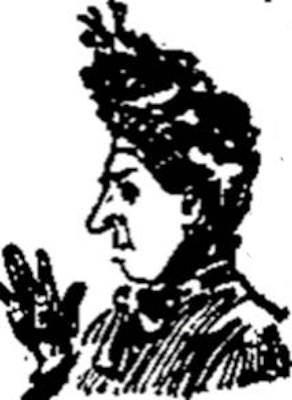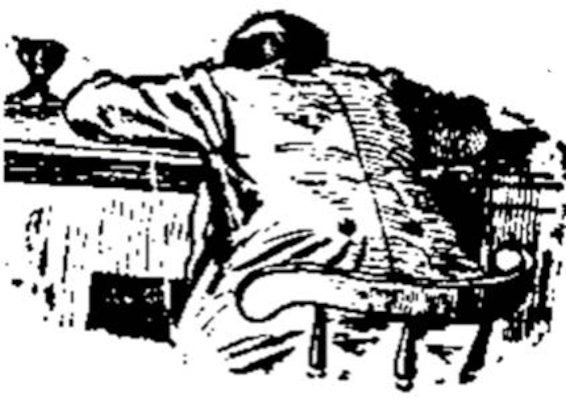This article has been transcribed from a copy of the Cardiff Times in the online collection of scanned Welsh newspapers 1804-1919 in the National Library of Wales, with grateful recognition of the free access accorded to all readers. Paragraph breaks have been introduced for easier reading.
Miss Tottie Tytes, ‘the unapproachable song and dance artiste’ has not been identified, and it may be an invented name to designate any ‘totty’ in tights. If so the use of ‘totty/tottie’ predates by a few months the first use of the word noted in OED, in the sense ‘[a] girl or woman, esp. a “good-time” girl’. This source follows the same spelling as ‘Samuel’. Neither has the music-hall performer, ‘the Great Bang’ been identified. ‘Collier Jim’, is possibly ‘Eawr Alley’ (Our Alley) by Adam Chester (January 26, 1863). See “Poetry of the Lancashire Cotton Famine.” Pitch and toss is a gambling game in which the person who manages to throw a coin closest to a mark gets to toss all the coins, winning those that land with the head up. —— David Skilton

He is a great ‘toff’ on a Sunday, is the junior clerk.
usually appears first of all at any given office accompanied by his mother, that is, unless he has already served a probationary term as office lad at the same establishment. He is usually a somewhat lanky, bony lad, whose limbs show a disposition to force themselves out of his clothes; his hair is as much plastered down as though it bad been brushed with a flat-iron, and his face shines with yellow soap. His mother has a much more confident air than he has, and she has a very expansive bonnet with a good deal of strings and bugles attached to it. In answer to the usual question as to whether the youth who accompanies her (and who shuffles his feet about and twirls his cap in a nervous fashion) is ‘well-behaved’ at home, she replies with great volubility, and in a manner intended to express something like pious horror that such a question should even be necessary in the case of any offspring of her, that the boy has ‘been brought hup most respectable and hupright; that his late schoolmaster had expressed an opinion (probably about the time that his fees were paid) that a more “striteforrarder” boy it would be impossible to find, that be writes beautiful, just like copper-plate, and that he has more brains than them that looks sharper.’ This latter opinion no doubt bears relation to the fact that the youth doesn't look of the brilliant kind. On the slightest encouragement the mother of the office-boy that is to be will expatiate at very great length on the boy's merits, and will garnish the relation with a pleasing record of his ‘'abits when a child,’ intermingled with a good deal of family history. She usually interlards her harangue with occasional admonitions to the miserable lad himself. ‘Now then, John James,’ she will break off to say, don't pull the brim of your billycock off, or ‘keep your feet still -- don't shuffle 'em as though you was step-dancing,’ or 'John James, what did the minister say when you recited “Collier Jim”?’

The junior’s ‘Ma,’ who usually introduces him to the firm.
However, our very junior clerk finally takes his place in the office, for probably his misguided and never-to-be-much-blamed parents think that they are going to make an independent gentleman of him by having him ‘put in an office,’ having him made into a clerk and a person who can consequently work ‘with his coat on.’ He is placed on a very high stool before a very highly polished desk, and he starts his business career. It is astonishing how he develops in general astuteness – if not morally and intellectually. Quiet and subdued though he be at first, he in the course of a few brief months lets everyone know that he is a very ‘fly’ [artful] person indeed, that he knows how many beans make five, that he knows who is a ‘thick un,’ [intolerable] and flyer than whole boat loads of monkeys. He is a high-spirited individual – when the boss is not about. He can be calm and abject enough then, but see him outside or when he thinks that the responsible heads of the office are away for half a day. He soon gives tokens of incipient manliness – or what he deems manliness. First of all he shows a most abnormal love of linen, so far as his personal adornment is concerned, and his collars and cuffs (the latter usually deposited in a cupboard during the time that he is the slave of the desk) are of fearful and wonderful proportions. Then he eats fewer two-penny pies from the confectioner around the corner during his dinner hour and consequently is enabled to purchase a fancy walking-cane and packets of cigarettes, without which articles no perfect gentleman's equipment is complete. Neckties of astounding pattern are also much to his taste, and when he leaves the office in his habitually jaunty style he whistles one of the airs of the ‘Great Bang’ or some other shining light of the music-halls, thus perfectly evidencing his knowledge of what his going on in the way of evening entertainment.
He is a tolerably happy personage, after all, is the junior clerk. There is generally in every office a bullying fellow, and this individual not uncommonly tyrannises frightfully over the junior clerk; but the latter is a bit of a philosopher in his own way, with all his puerile follies, and very wisely reflects that possibly his own time may come if he only watches the chances. Besides, has he not that ‘bit o' silver’ to draw weekly? And can he not read The Family Horror, or some other interesting periodical, under the lid of his desk, or under his blotting pad, at moments when his superior's attention is absorbed in business? True, it is rather hard to have a desperately exciting situation in which are concerned the hero, the heroine, and the villain interrupted by some rude request, as ‘Hi, there, look alive and hand over that petty cash book.’ Sometimes, too, his feelings are hurt in other ways, as when the cashier refers to him as ‘bones,’ or the boss sends him, in the absence of the errand boy, for two sandwiches and a bottle of beer, or a customer calls him ‘boy.’ He can't stand this latter at all, especially when his natural enemy, the office boy, is present. He is always, in his junior stage of clerkdom, addressed by his surname of Blobbs, or Pobbs, or anything you like, but he knows that some day he may develop into a ‘Mr’ like the two head-clerks. It seems to be the great ambition of clerks to rise to that stage of dignity in an office when they can claim the title of ‘Mr’ from the underlings. Our junior is not always too respectful in his references to his employer when that personage happens to be absent. On such occasions he refers to his master as ‘the old man,’ the ‘boss,’ the ‘guvnor,’ the slave driver, or even in still more derogatory terms, but he speaks with bated breath when his employer is present. When the ‘boss’ and the other responsible persons are away, what larks he does have along with other subordinate individuals. Whilst one clerk is playing at darts with the steel pens and an improvised board, two others are having a quiet game at pitch and toss, the office boy is endeavouring to stand on his head, and our friend the junior is practising a song and dance after the manner of Miss Tottie Tytes, ‘the unapproachable song and dance artiste,’ to employ the terms in which she is billed. It sometimes happens that the proceedings are suddenly interrupted by the unexpected advent of the boss, when there is a general ‘rowing’ all round and the junior clerk is in for it. But he survives this, and unfrequently gives a fall, generally untrue, and highly comical account of the interview for the edification of the other clerks.

Not a very cheerful sort of occupation for the term of one’s natural existence this.
Outside the office the junior clerk is a big man. Thanks be to cheap clothing and boundless ‘cheek,’ he passes as a man who holds a very responsible position where he is employed. He is rather fond than otherwise of talking of ‘our office,’ what the ‘guv'nor’ says to him, and the onerousness of his duties. He gives you the impression that he is the manager at least, but it is highly amusing all the same to see him suddenly meet his boss face to face in the park when he is swaggering about with a girl, a thick cigar, a pair of gaiters, and an astonishing pair of gloves. In vulgar parlance he ‘dries up,’ and sinks several degrees below zero even in the outward dignity of his demeanour. He generally affects to be a very knowing card, and to give his hearers at the office to understand that anything in connection with life about town which he does not know is not worth knowing. All the same it should be said that the extent of his dissipation is usually comprised in a visit to a singing room (when he deems himself madly dissipated if he treats one of the accommodating lady artistes with a drink, ‘a small gin and soda, if you don't mind’, or to the pit of a theatre, or to the balcony of a music-hall.
Poor fellow, whilst he is still little more than a junior, he frequently awakes some morning to the fact that he is a married man and that he has no trade – for clerking is no trade. He calmly resigns himself to the most hopeless and utter drudgery if he be a steady man, but should he be a trifle the reverse and happen to lose his berth, why, God help him. Far better would it have been for him had he been a journeyman joiner, a mason, or a smith, with power to roam abroad with a trade that he can always turn his hand to. Perhaps there is no man who earns his salt more wearisomely than the clerk, even when he does attain to a good position; but for the juniors, who are married there is, indeed, much of anxiety and tribulation.
Bibliography
Poetry of the Lancashire Cotton Famine. University of Exeter. Web. Accessed 11.03.2022.
Last modified 11 March 2022